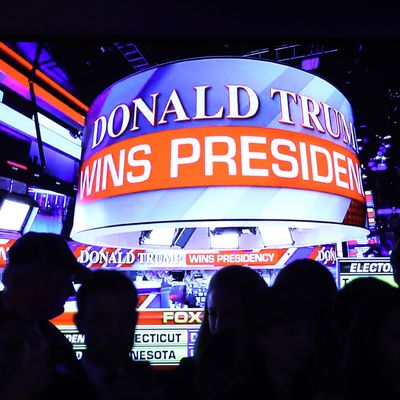
A lot of left-of-center people in my acquaintance spent the evening of November 8, 2016, at campaign events or at home, anticipating a solid Hillary Clinton win, some history-making, and the burial of the nightmarish campaign of Donald J. Trump.
I had to work that night and, in fact, as the shocking results became apparent (mostly via that steadily changing “forecast” meter on the New York Times site), I had to suppress any emotions and write a take on what it all meant. I mostly focused on the achievement of a GOP “trifecta” in Washington and the potential for vast changes in national policy through the instrument of budget-reconciliation bills (I was right that this would be the vehicle for an attempted GOP policy revolution, but wrong in assuming they’d muster enough unity to pull it off easily). Policy wonk that I am, this was alarming enough, without dwelling specifically on the significance of a person like Donald Trump moving into the White House.
Trump’s victory probably came as less of a shock to me than it did to other observers. My final prediction was that Hillary Clinton would win the popular vote by three percentage points; she actually won it by 2.1 percent. Down the stretch I wrote repeatedly about “Trump’s path to victory,” but always concluded he probably wouldn’t quite make it. Like most everybody, I couldn’t see him carrying all of his midwestern targets, which included three states (Michigan, Pennsylvania, and Wisconsin) that had not gone Republican in decades. But I never thought a Trump win was impossible.
I had, moreover, as a liberal baby-boomer, experienced a lot of traumatic Election Nights. Some, like the Nixon landslide of 1972 or the Reagan landslides of 1980 and 1984, were stunning in their magnitude but hardly surprising in terms of the winners and losers. Meanwhile, 2000 was less a shock than a long, numbing twilight saga that only turned unambiguously horrific at the very end, after everyone had imagined every imaginable result.
As I watched the stunned Hillary Clinton staffers emerge into the unexpected hellscape of Trump’s victory during that long night last November, I mostly remembered how I felt on the evening of November 2, 2004. I was very invested, emotionally and vocationally, in John Kerry’s candidacy. And as it happens, I accidentally gained real-time access to the exit polls before and after the raw votes began pouring in. They were, as some of you may recall, uniquely flawed exit polls, showing a clear Kerry win. So confident was I in their accuracy that I spent a good part of the evening calling friends and family to tell them to ignore that red tide of Bush wins on their television screens because I had seen the exits. I cringe with embarrassment at the memory even now.
Trump’s 2016 victory didn’t, to tell the truth, affect me much personally. My career prospects did not hang in the balance, and I was pretty far down the list of people whose rights a Trump administration might threaten. No one was going to arrest me at the border, and my odds of being abused during a traffic stop remained very low. Like most journalists, I figured, quite accurately, that a Trump presidency would mean a constant torrent of stuff to write about. And the immediate aftermath of Election Night was as busy as those early-morning hours of November 9, as many months of assumptions about a new Clinton administration had to be discarded for a very different reality.
Still, the realization that Donald J. Trump is president of the United States is one that knocked me sprawling now and then at both predictable (the Inauguration) and unpredictable (hearing “Hail to the Chief” played at his public appearances) moments. Some aspects of that incredible fact took a long time to absorb, such as the sudden mainstreaming of people (Sebastian Gorka? really?) and periodicals (Breitbart News) that I had thought of as elements of the freak-show fringe of extremist politics. Nearly every day, I have had to steel myself against the 20th-century fascist analogies that sprang to mind so often in observing the new administration and its preening leader. Watching conventional conservatives quickly swallow their own contempt for Trump and put on the psychic insignia of the new regime somehow made it all worse. Even if I wasn’t affected as a winner or loser in Trump’s America, I have been regularly aggrieved as a patriot.
I sometimes envy those who had a full emotional breakdown on November 8, 2016, and then had time to fully recover. There are ways to cope with post-traumatic stress disorder. Post-Trump stress disorder is a condition that will continue to cause less evolved progressives like me terrible tremors, until such time as there is a 46th president and new hopes and fears emerge. At my age, that can’t happen too soon.






























